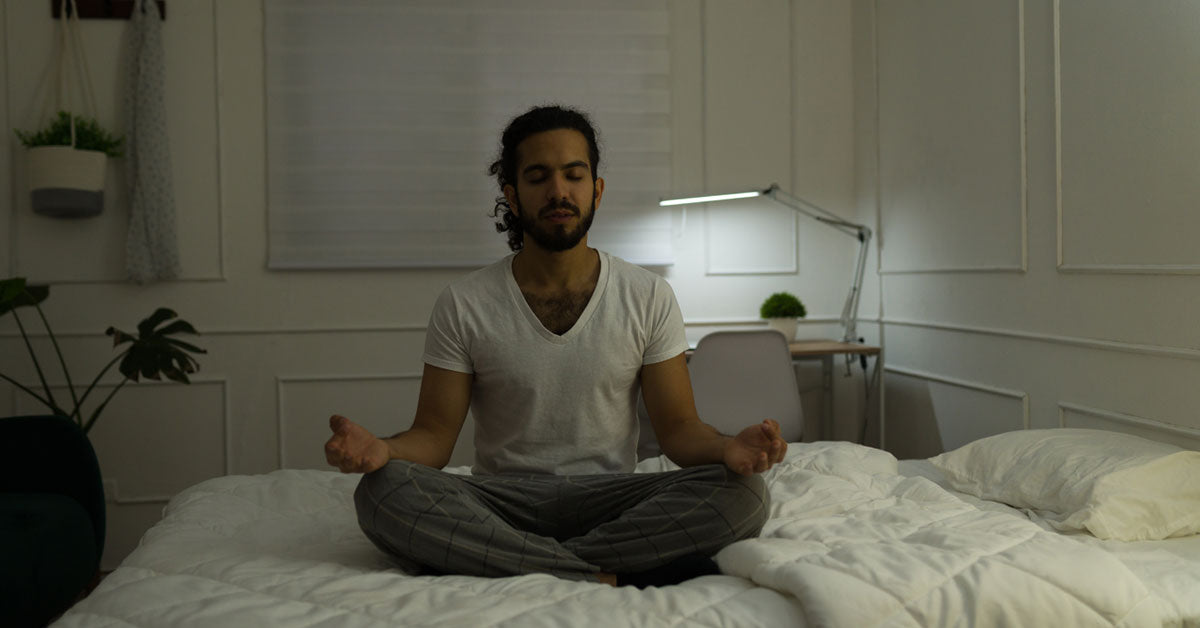Meditation for Sleep: Get a Good Night’s Rest!

Sleep is important to help our bodies recover and rejuvenate; however, many people don’t get an adequate amount of rest every night. Studies have found that about 40% of people[1] struggle to stay awake during the day, which can usually be attributed to a poor night’s sleep.
There are many ways to improve the quality of your sleep, such as setting a schedule and taking your tech devices out of your bedroom. However, one beneficial method that’s often overlooked is meditation for sleep. In this guide, we’ll introduce you to meditation, how it can help you sleep better, and how you can maximize its benefits.
An Overview of Meditation and What it Does
Let’s begin by taking a closer look at the practice of meditation. If you have never done it and you see someone meditating, it may look unusual, but you cannot truly appreciate this method until you try it out yourself.
Meditation is a way of achieving a clearer state of mind, and it’s also a practice that can significantly enhance your mental focus and promote calmness. Many people turn to this technique as a way to help stabilize their emotional state and enhance overall well-being.
Meditation for Sleep: What’s the Connection?
Meditation for sleep is sometimes seen as a subcategory of the practice, but it involves some of the same types of strategies as other forms of meditation. The main goal is to incorporate techniques that prioritize calmness and relaxation.
Many people have difficulty falling asleep due to racing thoughts and difficulty relaxing. If this is the case with you, meditation promotes calmness, helping you to switch off and get into the right mindset for restorative sleep.
The Impact of Meditation on Sleep
There are a few different ways meditation can help improve your sleep no matter which specific techniques you employ. In one study[2], researchers found that a meditation session helped to increase the amount of melatonin released by the pineal gland in the brain. This hormone induces drowsiness when it gets dark outside and helps regulate the sleep-wake cycle.
According to research, meditation also helps to improve your overall sleep quality[3]. While sleep duration is important, it’s also essential that you get quality rest for proper restoration and rejuvenation.
Benefits of Sleep Meditation
To truly understand how night meditation can benefit you, knowing what happens if you don’t get enough sleep is important. If you’re sleep-deprived you'll likely be tired during the daytime and may need a refreshing nap. Your productivity could start to decline, and there are also physical symptoms that can manifest.
Long-term sleep deprivation can increase your risk of obesity, type 2 diabetes, heart disease, and several other health conditions. By improving your sleep quality, meditation not only helps you feel more alert during the day but also mitigates these risks.
Types of Meditation for Sleep
If you’re interested in meditation, you should know that there are several different types you can explore to discover which works best for you. For example, the best-guided sleep meditation works well for some people, whereas yoga might be a better choice for someone else. Let’s take a closer look at some of the different types of meditation that work well to improve sleep.
-
Mindfulness Meditation: This is one of the most common types of meditation, and it begins with you sitting in a calm space in a relaxing position to focus your thoughts, accept your surroundings, and become more aware of your emotional state. You then use strategies to gradually calm your mind and slow your wandering thoughts. Some people may combine this method with taking NUU3 Keep Calm Gummies to help them relax more quickly.
-
Guided Meditation: With guided meditation, you listen to music, guided audio, or follow a body scan technique. It generally depends on external input that guides you through the entire meditation session. The best-guided sleep meditation depends on what works in your situation.
-
Qigong: This is an ancient technique that combines gentle movements, breathing exercises, and meditation.
-
Tai Chi: While not for everyone, Tai Chi meditation focuses on carrying out slow movements that gradually improve self-awareness and calm your state of mind.
-
Yoga: Although yoga is often seen as a form of exercise, it’s also great for meditation, promoting calm, and gaining greater control over your thoughts. Yoga strengthens the immune system, as well as other parts of your body. Taking a supplement like NUU3 Greenpura alongside practicing yoga can enhance some of these effects by providing your body with antioxidants and other healthy natural compounds.
How to Practicing Sleep Meditation at Home
We’ve considered what meditation for sleep can do for you, and now you might want to try it yourself. If you’re unsure where to start, this mini guide should help.
Yoga is a beneficial meditation technique for sleep. Some of the most effective positions include the Locust, Lizard, Standing Forward, Head-of-the-Knee, and Seated Forward moves. Another great option is guided meditation, and many phone apps you can download will help you through the entire process. Some apps give you access to other meditation strategies, for example, they may offer the best-guided sleep meditation techniques, or show you how to perform specific yoga poses to calm down, relax, and eliminate stress.
Tips to Create a Sleep Hygiene Routine
We’ve focused on meditation for sleep thus far, but when it comes to getting quality rest it’s also important to discuss sleep hygiene. This refers to your routine before and after you go to bed, such as showering or watching a short episode of your favorite show on Netflix or Hulu. These are practices that help some people calm down before bed, but we suggest that you also prioritize the methods we have already mentioned.
Apart from following the best guided sleep meditation or a similar technique that works for you, we recommend creating a regular nighttime routine. For example, take a shower before sleep, followed by carrying out your meditation. Some people find that drinking herbal tea before bed helps them sleep. Sleep Support Gummies are also an option to consider, as this potent natural product reduces stress and helps you remain calm before bed.
FAQs
What is the highest form of meditation?
According to Buddhism, if you go through all of the different levels of meditation you eventually reach ‘Samma-Samadhi’ which is considered the highest form of the practice. At this stage, it is theorized that you truly have a better understanding of life and everything around you.
What are the 7 stages of meditation?
There are seven stages that people usually associate with this practice, including sleep meditation. They include a focus on the body, then your feelings, awareness of your surroundings and self, loving-kindness, the ability to release, achieving self-fulfillment, and finally no duality.
What are the three basic practices of meditation?
As you follow your meditation for sleep journey, you’ll learn the 3 simple practices associated with it. The first is the method you choose, followed by the actual practice, and the third is the integration of the techniques into your life.
Final Verdict
Meditation has several benefits to offer both physical and mental health, and if you struggle to sleep at night it could make a significant difference. While it may seem like a basic technique at first, once you get the hang of meditation for sleep you’ll quickly realize the advantages that it can provide.
It’s important to start slow, especially if you’ve never meditated before. Many people find it takes some time to get used to, but once you learn how to meditate properly you’ll begin to experience the benefits that this practice provides to your sleep and overall well-being.
References
1] ↑https://www.nhlbi.nih.gov/health/sleep-deprivation
2] ↑https://www.ncbi.nlm.nih.gov/pmc/articles/PMC3328970/
3] ↑https://www.ncbi.nlm.nih.gov/pmc/articles/PMC6557693












